Share
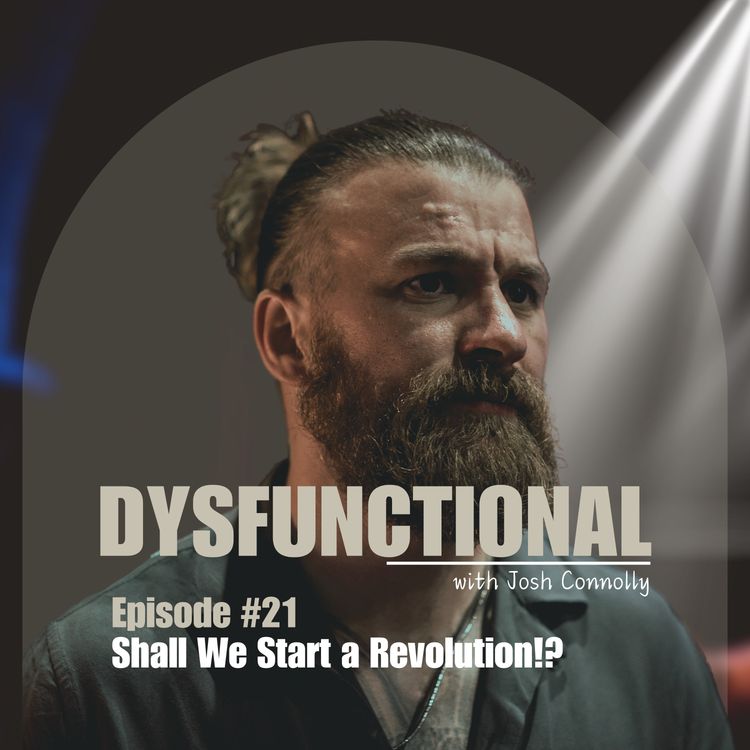
Dysfunctional
Shall We Start a Revolution!?
Alright, here we go... In this episode, I’m diving into what I believe might just be the most important conversation we need to be having right now...how do we actually change the system?
I talk about how we’re all living in a society that mirrors the same abusive dynamics so many of us grew up with in our families. We’re divided, disconnected, and constantly fighting each other which just helps those in power stay exactly where they are.
This one’s about community. Real community. Not the online echo chambers where everyone has to agree to belong , I’m talking about old school, village-style connection, where we come together because we’re different, not in spite of it.
I unpack how we ended up so fragmented, why disagreement shouldn’t mean disconnection, and why true change will never happen if we keep shouting sideways instead of looking up.
It’s not a polished TED Talk but it's me, raw and thinking out loud. Crunchy in places. Sweary in others. But hopefully, real enough to get us thinking.
Let’s start a revolution. Together.
00:00 Introduction and Episode Theme
00:45 The Family System and Society
02:08 Community as a Solution
05:37 The Evolution of Community
12:50 Challenges in Modern Communities
22:16 The Power Imbalance in Society
31:16 Call to Action: Rebuilding Community
36:48 Conclusion and Future Plans
More episodes
View all episodes
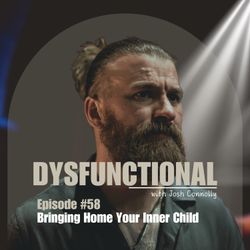
58. Bringing Home Your Inner Child
19:35||Season 1, Ep. 58In this solo episode of Dysfunctional, I walk through the six chapters of the Inner You process and share why this work has been so important in my own healing.We talk about intention, self-compassion, meeting the different versions of yourself, healing relationships, and what inner child work actually looks like in real life.This is an honest, grounded conversation about integration, emotional safety, and learning to come home to yourself.If you’ve ever felt disconnected, reactive, or unsure why certain things hit you so hard, this episode is for you.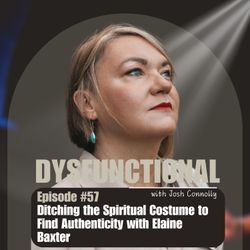
57. Ditching the Spiritual Costume to Find Authenticity with Elaine Baxter
01:16:36||Season 1, Ep. 57In this episode, I’m joined by Elaine Baxter, a breathwork facilitator who’s been through the full arc of modern wellness, from fixing and performing, to actually holding space in a way that’s real.We talk about ditching the “spiritual costume” and why so much of the healing industry rewards masks over authenticity. Elaine shares how breathwork helped her reconnect with feeling after years of numbness, grief, people-pleasing, and trying to hold everything together.We explore what trauma-informed actually looks like in practice, the difference between fixing and holding, and why safety, honesty, and grounded language matter more than aesthetics, labels, or vibes.This conversation is for anyone who wants deep work without the performance, and real healing without having to become someone they’re not.Elaine is a Breathwork Facilitator who has supported people in processing emotions through the breath since 2020 and is a qualified Inner You Breathwork Facilitator. At the heart of Elaine’s practice is a commitment to creating a safe, compassionate, and non-judgemental space, where people are met without pressure to change and genuine healing can naturally unfold.https://www.instagram.com/rebalance_with_elainehttps://misneachcentre.ie/allied-health-professionals/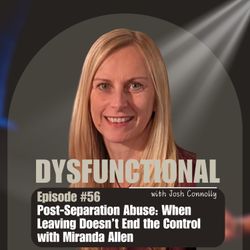
56. Post-Separation Abuse: When Leaving Doesn’t End the Control with Miranda Allen
37:38||Season 1, Ep. 56Leaving an abusive relationship doesn’t always mean the abuse stops.In this episode, Josh speaks with Miranda Allen, an ambassador for Mums in Need, about post-separation abuse and how control continues through courts, finances, smear campaigns, and children. Miranda shares her lived experience and why believing survivors matters more than ever.Learn more or support the work of Mums in Need:👉 https://mumsinneed.com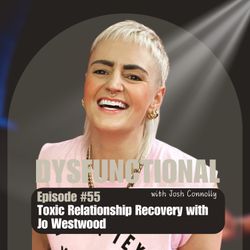
55. Toxic Relationship Recovery with Jo Westwood
01:30:52||Season 1, Ep. 55In this episode of Dysfunctional, I’m joined by relationship recovery coach Jo Westwood for a deep, honest conversation about toxic relationships, codependency, and what real self-worth actually sounds like in practice.We talk about love bombing and how to spot it early, the moment “the switch” happens after commitment, and why being nice, polite, or endlessly understanding can quietly turn into self-abandonment.We also unpack why so many people rush to defend power, fame, and parents at all costs, using the viral Anthony Hopkins estrangement clip as a real-world example of how society struggles with accountability, family loyalty myths, and reading the energy behind someone’s words.This is a conversation about slowing down, trusting your instincts, and learning to say:“You don’t know me well enough yet.”And meaning it.We explore:The difference between love bombing and genuine connectionWhy codependent people can be manipulative without meaning to beThe “special one” fantasy and how it keeps people stuckWhy healthy relationships can handle a slow startEstrangement, boundaries, and the myth of unconditional family loyaltyPoliteness vs kindness, and why people-pleasing pushes people awayWhy abusive people don’t cut you off, and why survivors often have toThis episode isn’t about blame, cancel culture, or perfect healing.It’s about self-reflection, personal responsibility, and building relationships that don’t require you to disappear to keep the peace.If you’ve ever felt confused, drained, or like you keep ending up in the same painful dynamics, this one’s for you.Find Jo:Website: http://jowestwood.comIG: http://instagram.com/jowestwoodThe Anti People Pleasing Podcast link: Apple: https://podcasts.apple.com/gb/podcast/the-anti-people-pleasing-podcast/id1576679526Spotify: https://open.spotify.com/show/4av63LLVwYNt8MNMu8YgarAudible: https://www.audible.co.uk/podcast/The-Anti-People-Pleasing-Podcast/B08K61YDSF
54. When Your Parent Is Murdered | Alex Williams on Childhood Trauma
01:17:03||Season 1, Ep. 54Alex Williams was eight years old when his mum was murdered by his stepfather.In this episode, Alex shares what it’s really like to grow up after extreme trauma, how it shaped his nervous system, identity, and relationships, and why “healing” is often misunderstood.Alex is an NHS mental health practitioner with over 20 years of experience and a suicide and self-harm prevention trainer. He brings both lived experience and frontline insight into what actually helps people after childhood trauma, and what doesn’t.We talk about:Growing up after domestic abuse and parental homicideWhy safety matters more than therapy in the early stages of traumaThe long-term impact of unprocessed grief in childhoodCompassion fatigue in mental health and helping professionsWhy forgiveness is not required for healingHow the mental health system labels people instead of holding themPhone addiction, numbing, and modern forms of escapeMeaning, survival, and choosing a life after traumaThis is a raw, honest conversation about loss, resilience, and what it means to live a good life after something unimaginable.If you grew up in dysfunction, abuse, or emotional neglect, this episode will likely resonate.Find Alex here - https//instagram.com/thealexjwilliamshttps//tiktok.com/thealexjwilliamshttps//www.linkedin.com/thealexjwilliams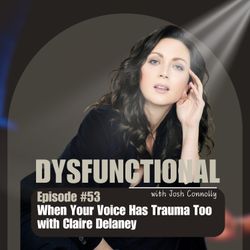
53. When Your Voice Has Trauma Too with Claire Delaney
01:15:26||Season 1, Ep. 53Trauma doesn’t just live in your head. It can shut down your voice too. Vocal coach Claire Delaney joins me to talk C-PTSD, nervous system survival, toxic industry culture, and finding your voice again."Claire is a vocal coach who works with singers and actors whose voices have to hold up under real-world pressure. She’s coached performers across the West End, Broadway, and the National Theatre, and has worked for Italia Conti and ITV’s Mamma Mia: I Have a Dream. Her approach is trauma-aware and shaped by the belief that you can’t separate a voice from the person using it. Her work blends science, psychology, and practical technique, with a lens shaped by lived-experience. She helps performers rebuild the physical, emotional, and technical foundations of their voice, aiming for long-term reliability, confidence, and self-trust to make singing actually enjoyable again."Instagram: @clairedelaney.vocalcoach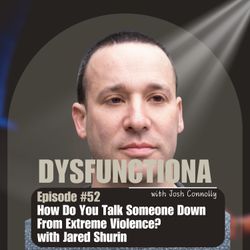
52. How Do You Talk Someone Down From Extreme Violence? with Jared Shurin
01:04:23||Season 1, Ep. 52In this episode I’m joined by Jared Shurin, a strategic communications specialist who works in counter extremism, violent radicalisation, misinformation, and social cohesion. We dig into the psychology of people who reach the point of extreme violence, why it often starts with the loss of trust, hope and faith, and how communication can pull people back from the edge.We talk about:How people become vulnerable to radicalisationThe link between extremism, suicidality, and hopelessnessWhy most people sit in the exhausted moderate middleThe role of belonging, community, and agency in preventionHow governments, NGOs and everyday people can reduce social harmWhat actually works when trying to talk someone down from violent thinkingThis episode explores the real human drivers behind extremism, how isolation fuels dangerous behaviour, and why rebuilding local community may be our best defence.Find Jared - https://extra-fox.com/newsletter - https://raptorvelocity.beehiiv.com/https://www.instagram.com/straycarnivore/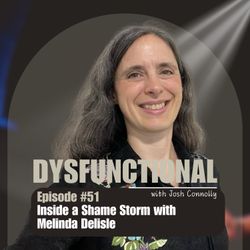
51. Inside a Shame Storm with Melinda Delisle
01:17:23||Season 1, Ep. 51What if those moments where you’re convinced you’re a horrible person who “shouldn’t even be here” aren’t proof that you’re broken… but that you’re in what my guest calls a shame storm?In this episode I’m joined by Melinda Delisle, MS LCCE – clinical nutritionist, former childbirth educator, and someone who has spent years navigating intense emotional dysregulation herself. We talk honestly about what it actually feels like inside a shame storm, why some of the most popular “healing tools” can make it worse, and how food, supplements and nervous system health quietly drive so much of our emotional world.We get into:- The difference between a shame swamp, a shame spiral and a full-blown shame storm- Why gratitude lists, mindfulness and “just be present” advice can feel like gaslighting when you’re in survival mode- How trauma, high sensitivity and people-pleasing set us up for chronic hypervigilance - The link between nutrition, B vitamins, SSRIs and emotional dysregulation-- Mistaking familiarity for safety – and why so many of us feel unsafe even with “nice” people- Self-parenting, accountability and facing the ways our own dysregulation can make us the “toxic” one at homeMelinda also shares a free upcoming 4-week program she’s creating to help people build awareness, have better conversations around triggers and start finding their way out of constant dysregulation.Substack: https://melindadelisle.substack.com/Free 4-week program: https://melindadelisle.com/foundation/ Instagram: @melindadelisleLinkedIn: https://www.linkedin.com/in/melinda-delisle/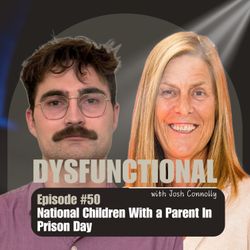
50. National Children With a Parent In Prison Day
59:35||Season 1, Ep. 50Children with a parent in prison are some of the most invisible kids in the country. In this episode, I sit down with Sarah (founder of charity Children Heard and Seen) and Felix (communications officer) to talk about what really happens to those children when a parent goes to prison, and why nobody is officially keeping track of them.We talk about:How Children Heard and Seen supports kids in the community with mentoring, groups and one to one supportThe shocking reality of children left completely alone at home when a parent is sent to prisonWhy there is no national data on which children have a parent in prisonThe role of media, stigma and vigilante attacks on already vulnerable familiesWhy support must be child led, not focused on “fixing” the parent or forcing contactThe first ever Children with a Parent in Prison Day (25th November) and the national conferenceIf this episode moved you, please share it, talk about it with someone, and check out Children Heard and Seen to see how you can support or spread the word.Link to the conference:https://www.eventbrite.co.uk/e/hear-me-see-me-parental-imprisonment-lived-experience-conference-tickets-1700692921309?aff=oddtdtcreatorLink to our website: https://childrenheardandseen.co.uk/Lived Experience Blogs written by adults who had a parent in prison as a child:https://childrenheardandseen.co.uk/hidden-voices/#parentalimprisonment